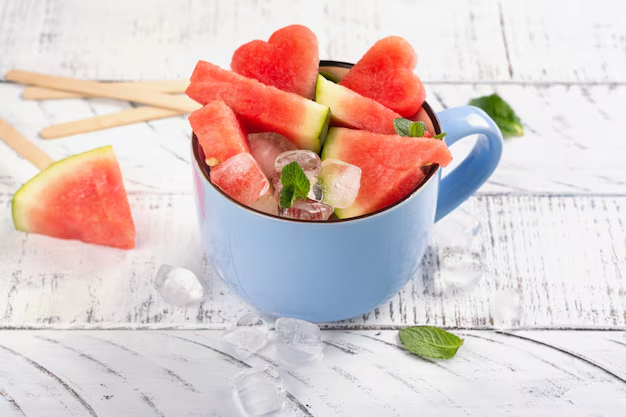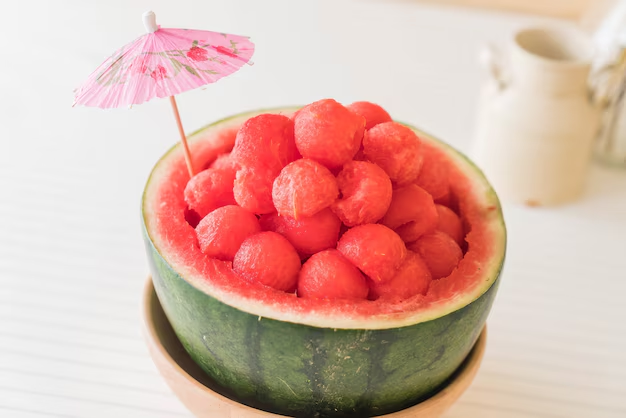Hydration is essential for maintaining overall health. From regulating body temperature to ensuring smooth bodily functions, staying hydrated is crucial. While water is often considered the go-to option, certain foods like watermelon offer a natural, refreshing, and nutrient-packed alternative. Is watermelon good for hydration? Let’s dive in to understand how this juicy fruit can keep you hydrated and support your health.
Why Is Watermelon Good for Hydration?
Watermelon is often hailed as a hydration powerhouse. This is because it combines high water content with essential nutrients, making it a superior choice for staying refreshed.
The Water Content of Watermelon
Watermelon is composed of about 92% water, making it one of the most water-rich fruits available.
- Foods high in water content contribute significantly to hydration by replenishing body fluids.
- Watermelon’s water-rich composition not only quenches thirst but also aids in reducing fatigue, especially during hot days.
- Unlike plain water, watermelon also provides nutrients that enhance the hydration process.
High-water-content foods help regulate hydration at a cellular level, ensuring efficient water absorption and distribution throughout the body. With each bite, you’re not just satisfying your taste buds but also giving your body a hydrating boost.
Essential Electrolytes in Watermelon
Watermelon is not just about water; it’s also packed with electrolytes like potassium and magnesium.
- Potassium helps maintain fluid balance, preventing dehydration.
- Magnesium supports muscle function and combats fatigue, especially post-exercise.
These electrolytes in watermelon function similarly to those found in sports drinks but without the added sugars and artificial ingredients. Incorporating watermelon into your diet is a natural and effective way to replenish lost electrolytes.
Is Watermelon Better Than Water for Hydration?
While water is essential, watermelon offers a blend of hydration and nutrition that plain water cannot.
Comparison Between Water and Watermelon
Watermelon provides more than just hydration.
- Along with 92% water, it delivers vitamins like C and A, antioxidants, and lycopene.
- These nutrients work together to support skin health, boost immunity, and reduce inflammation.
Unlike water, which solely hydrates, watermelon enhances hydration with added nutritional benefits. This makes it a superior choice during summer or after workouts when your body needs replenishment.
Read: Watermelon & Cucumber Cooler
Health Benefits of Watermelon for Hydration and Beyond

Watermelon is more than a hydrating fruit. Its rich nutrient profile offers multiple health benefits.
Packed with Essential Nutrients
- Vitamin C: Strengthens the immune system and promotes glowing skin.
- Lycopene: A powerful antioxidant that protects against oxidative stress and supports heart health.
- Amino acids: Promote muscle recovery and improve blood flow.
These nutrients make watermelon a great addition to any diet, providing energy and improving overall wellness.
Supports Skin and Digestion
- The high water content helps maintain skin elasticity and combats dryness.
- Watermelon contains dietary fiber, which aids digestion and prevents constipation.
By including watermelon in your daily routine, you’ll feel refreshed both inside and out.
Is Watermelon Good for Dehydration Recovery?
Watermelon can be a game-changer when recovering from dehydration. Its unique combination of water, electrolytes, and nutrients helps restore balance quickly.
Watermelon vs. Other Foods for Dehydration
Compared to other high-water-content foods like cucumber, oranges, and strawberries, watermelon stands out.
- Its larger water volume makes it a better choice for rapid hydration.
- The added electrolytes and sugars in watermelon provide instant energy and rehydration.
Whether you’re recovering from exercise or a hot day, watermelon can be your go-to option for combating dehydration effectively.
Why Is Watermelon So Hydrating?
The magic of watermelon’s hydration lies in its perfect combination of water, fiber, and natural sugars.
The Synergy of Key Components
- Water: Hydrates the body instantly.
- Fiber: Ensures slower water release, keeping you hydrated longer.
- Natural Sugars: Enhance the absorption of water, making the process efficient.
This synergy makes watermelon one of the most hydrating and refreshing fruits available. Whether eaten fresh or blended into a smoothie, it’s a versatile way to stay hydrated.
Other Best Foods for Hydration and Dehydration Recovery
While watermelon is a standout choice for hydration, there are other foods rich in water content that can support your hydration needs effectively.
Top Hydrating Foods
- Cucumber
- Composed of 95% water, cucumbers are one of the most hydrating vegetables.
- They are low in calories and packed with vitamins like K and C, making them ideal for hydration and overall health.
- Celery
- Celery is made up of about 95% water, similar to cucumber.
- It is also a good source of electrolytes like potassium and sodium, making it an excellent snack for replenishing lost fluids.
- Lettuce
- Varieties like iceberg lettuce contain about 96% water.
- Adding lettuce to salads or sandwiches can boost your water intake effortlessly.
- Oranges and Strawberries
- Oranges provide about 88% water content and are rich in vitamin C.
- Strawberries, with 91% water, are another hydrating fruit loaded with antioxidants and vitamins.
Positioning Watermelon as the Hydration Leader
Among all these foods, watermelon stands out as one of the highest water-content fruits, with 92% water. Unlike others, it combines hydration with a robust nutritional profile, including vitamins, minerals, and natural sugars. This makes watermelon a versatile choice for hydration and recovery, whether consumed fresh, juiced or blended into a smoothie.
Watermelon Nutrition: What Makes It a Hydrating Superfood?

Watermelon’s nutritional profile is what truly sets it apart. It’s not just the water content but the added vitamins, minerals, and other components that make it a hydrating superfood.
Water Content
- Watermelon is made up of 92% water, which provides immediate hydration to your body.
- This high water content aids in replenishing fluids lost through sweat and helps regulate body temperature.
Essential Vitamins
- Vitamin A
- Promotes skin health by maintaining moisture and aiding in cell repair.
- Supports vision and immune function.
- Vitamin C
- Boosts immunity and combats oxidative stress.
- Enhances skin elasticity, giving it a youthful glow.
- Vitamin B6
- Aids in energy production by metabolizing carbohydrates and proteins.
- Supports brain health and reduces fatigue.
Minerals That Hydrate
- Potassium
- Helps regulate fluid balance and prevents dehydration.
- Reduces muscle cramps and supports heart health.
- Magnesium
- Plays a role in muscle relaxation and energy production.
- Replenishes electrolytes lost during exercise or sweating.
Low-Calorie and Fat-Free Profile
- A 1-cup serving of watermelon contains just about 46 calories, making it perfect to add to a low-calorie meal.
- It’s naturally fat-free, making it perfect for those watching their calorie intake.
The Hydration Superfood
With its combination of high water content, essential vitamins, minerals, and low-calorie nature, watermelon truly earns its title as a hydrating superfood. It’s not just about quenching your thirst but nourishing your body with every bite.
FAQs
1. Can watermelon replace water entirely for hydration?
No, while watermelon is highly hydrating, it should complement water, not replace it. Watermelon provides additional nutrients, but drinking plain water remains crucial for overall hydration.
2. How much watermelon should I eat for hydration?
Eating 1-2 cups of watermelon daily provides sufficient water, electrolytes, and nutrients to support hydration while staying low in calories. This portion balances hydration without overloading on natural sugars.
3. Is watermelon better than sports drinks for hydration?
Yes, watermelon naturally provides electrolytes like potassium and magnesium without artificial sugars or chemicals. It’s a healthier, nutrient-packed alternative to sports drinks for replenishing fluids and maintaining energy levels.
4. Can watermelon help with heat exhaustion?
Absolutely. Watermelon’s high water content and natural sugars restore hydration and energy, while electrolytes like potassium help balance fluids, making it ideal for cooling down and recovering from heat exhaustion.
5. Are there any side effects of eating too much watermelon?
Eating excessive watermelon can cause bloating, digestive discomfort, or spikes in blood sugar due to its natural sugars. Moderation is key to enjoying its benefits without adverse effects.
Conclusion
Watermelon is not just a delicious treat; it’s a hydration powerhouse packed with essential nutrients. Its high water content, combined with electrolytes and natural sugars, makes it an excellent choice for staying hydrated, especially during summer. From supporting skin health to aiding digestion and dehydration recovery, watermelon offers numerous health benefits beyond hydration. So, next time you’re looking to quench your thirst, consider grabbing a slice of this refreshing fruit.

